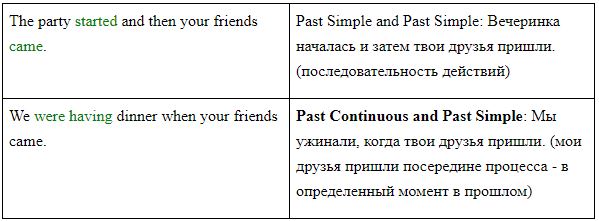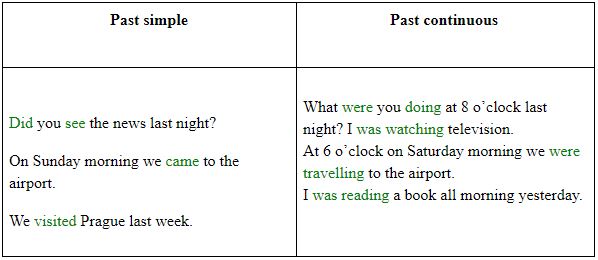Past Simple и Past Continuous: правила и различия
Две английские формы времени Past Simple (прошедшее простое) и Past Continuous (прошедшее длительное) обозначают события, которые произошли в прошлом и не имеют никакой связи с настоящим. Главное отличие Past Simple от Past Continuous заключается в том, что в первом случае нам важно показать последовательность событий в прошлом, а во втором - подчеркнуть длительность действия в конкретный момент времени в прошлом.
Как отличить Past Simple от Past Continuous?
Past Simple используется для последовательности событий в прошлом, когда нам важно показать, какое событие произошло первым. Past Continuous выражает процесс в определенный момент в прошлом.
Сравнительная таблица Past Continuous и Past Simple.
Например:
Чем Past Simple отличается от Past Continuous.
1. Мы часто используем Past Continuous и Past Simple вместе. Когда это происходит, Continuous описывает более длительное действие или ситуацию, на фоне которой происходит однократное событие.
e.g. When I woke up this morning it was raining .
I was walking home, when I saw my old friend buying a newspaper.
I broke my leg when I was skiing .
I was playing a computer game when my phone rang .
В данных примерах Past Continuous описывает ситуации, которые продолжаются в течение некоторого времени - «was skiing» и «was playing», в то время как Past Simple описывает действия, которые происходят быстро - «broke» и «rang».
2. Мы используем Past Continuous, когда говорим о том, что происходило в определенное время или в период времени в прошлом. В отличие от Past Continuous Past Simple употребляется для выражения однократного действия в прошлом.
- from … till — с … до…
- all day – весь день
- the whole evening – целый вечер

Упражнение 1. Раскройте скобки, употребляя глаголы в Past Simple или Past Continuous.
- I (to go) to the cinema yesterday.
- I (to go) to the cinema at four o’clock yesterday.
- They (to go) to the cinema when they met me.
- She (to learn) words the whole evening yesterday.
- She (to learn) words when mother came home.
- He (to work) in the garden yesterday.
- He (to work) in the garden from five till eight yesterday.
- My sister is fond of reading. She (to read) the whole evening yesterday.
- The children (to do) their lessons at six o’clock yesterday.
- I (not to play) the piano yesterday. I (to write) a letter to my friend.
- I (not to play) the piano at four o’clock yesterday. I (to read) a book.
- He (not to sleep) when father came home. He (to do) his homework.
- When I (to go) to school the day before yesterday, I met Mike and Pete. They (to talk) and (to eat) an ice-cream.
- The baby (to sleep) the whole evening yesterday. She (feel) bad.
- What your father (to do) from eight till nine yesterday?
- Why she (to cry) when I saw her yesterday?
Упражнение 2. Заполните пропуски в диалоге, используя глаголы в Past Simple или Past Continuous.
Ann: How ____ your holiday at the seaside?
Ben: Oh, it ____ wonderful, thank you! We ____ a great fun!
Ann: What (you / do)______________there?
Ben: In the mornings, while my parents still (have breakfast) _______, I (play) _____ tennis with my friend Harry. After that, at about 10 o’clock we (swim) _____ in the sea and (play)______ football on the beach.
Ann: Yes, that sounds good! And what (you / do)______ in the afternoons after your lunch?
Ben: After lunch (we / go)______ on some interesting excursions around the place where (we / stay) _______ that week. In the evenings after dinner (we /watch)_______ films on TV or (we / play) ______ chess with my Dad.
Ann: I see, and what (you / do)_______ between 5 pm and dinner time?
Ben: Well, when the weather was nice and warm, my friend and I (have fun)_______ at the seaside. We (swim)________or (play)_________volleyball on the beach.
Ann: Fantastic! Next time I’ll go with you.
Упражнение 3. Переведите предложения на английский язык, используя глаголы в Past Simple или Past Continuous.
- В то время, когда Катя путешествовала по Америке, она узнала, что известная поп-звезда выступает в Лос-Анджелесе.
- Я смотрел телевизор в то время, когда случилось это ужасное происшествие.
- Когда прозвенел звонок, ученики все еще писали сочинение.
- Что Вы делали вчера в пять часов вечера? — Вчера в пять часов вечера я ехал на машине и слушал радио.
- Ты видела Сергея и Михаила в воскресенье? — Да, когда я их видела, они играли в волейбол в парке. — Странно, они обычно играют в парке по субботам.
Упражнение 4. Заполните пропуски в диалоге, используя глаголы в Past Simple или Past Continuous.
- ____ you _____ (to wait) for me at 5 p.m.? — Yes, I ____.
- They_____ (to finish) their work at 11 o’clock and then ______ (to come) home.
- It _____ (to get) dark, so we______(to decide) to return.
- While Jack _______ (to translate) the text, we______ (to work) on the project.
- A young man (to run) out into the street. He ______(to carry) a cat in his hands.
- What______you______(to do) when I ______(to phone) you yesterday?
- John______(to listen) to the radio when the batteries ______(to run) out.
- The robbers______(to steal) the car and they _____ (to drive) away.
- She______(to go) to buy a dress, but a thief _____ (to steal) all her money.
- She______ (to slip),______ (to fall) over and______ (to break) her leg.
- I ____ a light in your window as I ______ (to go) by.
- Yesterday while I ______ (to walk) down Cherry Lane, I ______ (to meet) my friend Thomas.
Упражнение 5. Заполните пропуски, используя while или when.
Союз while подчеркивает длительность и глагол после него ставится в Continuous, в то время как when подчеркивает факт, и глагол после него ставится в Simple.
СРАВНИТЕ:
- While I was having a bath, the telephone rang.
- I was having a bath when the telephone rang.
1. I was waiting for the school bus … I saw Nathan.
2. My mum preparing dinner … telephone rang.
3. Paul and Mary finished their work … Granny was making tea.
4. The vase fell from the shelf, … I was watching TV.
5. I was driving along … a dog ran onto the road.
6. My sister was washing her hair … she was listening to the music.
* * *
Упражнение 6. Заполните пропуски глаголами в Past Continuous или Past Simple и переведите предложения.
- Peter (stay) at a seaside hotel on holiday when he (meet) his friend.
- While I (have) lunch the sun (come) out again.
- Who … you (talk to) on the telephone when I came?
- While Mary (read) the letter she (notice) many spelling mistakes.
- She (go) to bed when suddenly she (see) a mouse.
- We (sit) down to dinner when the doorbell (ring).
- Mary’s grandfather (hurt) his back while he (dig) in the vegetable garden yesterday.
- While he (sleep), the doctor (arrive).
- What … she (wear) when you (see) her at the party?
- What… she (want) when she (visit) you yesterday?
- Somebody (knock) on the front door while I (have) breakfast.
- How much money … you (spend) last Christmas?
- My father (give) me money and I (spend) it all in one day.
- Peter (not/feel) very well, so he (consult) his doctor.
- Where …you (live) at this time last year?
- Peter (not/look) at me as he (speak).
- When the ambulance (arrive), the patient (sleep) like a child.
- I (read) when he (call).
- They (wait) for the bus when I (see) them.
- What …you (do) when you (see) them?
Упражнение 7 А. Раскройте скобки и поставьте глаголы в нужной форме.
I ____ (meet) a man in a pub once and he _____ (tell) me this story. A friend of his______ (work) on his car one morning. This friend ______(have) a large dog. Before he _______ (start) work, he ________ (put) the dog in the car and _________ (close) the door. Well, he was under his car, ________ (work) busily, when suddenly he _________ (hear) a mechanical noise, and the car ________ (start) to move forward. He ________ (jump) up, but too late — the car ___________ (roll) slowly down the hill, and the dog __________ (sit) at the wheel as if it _________ (drive). Finally, it ________ (come) to rest in a neighbour’s garden.
Упражнение 7 Б. Раскройте скобки и поставьте глаголы в нужной форме.
When I ____ (go) shopping, I _____ (see) my friend. I ___ (say) ‘Hello!’ and we____ (start) talking. While we _____ (talk), a car _____ (run into) a man on a bike. When we _______ (see) the accident, I ______ (phone) for an ambulance. While I _______ (wait) for the ambulance, a policeman _______ (arrive). He (ask) us some questions. The ambulance _______ (come), while I ________ (talk) to the policeman. The ambulance _______ (take) the man to hospital and we _______ (go) to a cafe for a cup of coffee. While we ______ (drink) our coffee, we _______ (discuss) about the accident.


Комментариев нет:
Отправить комментарий